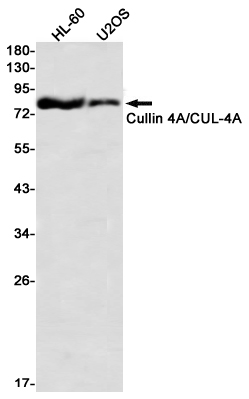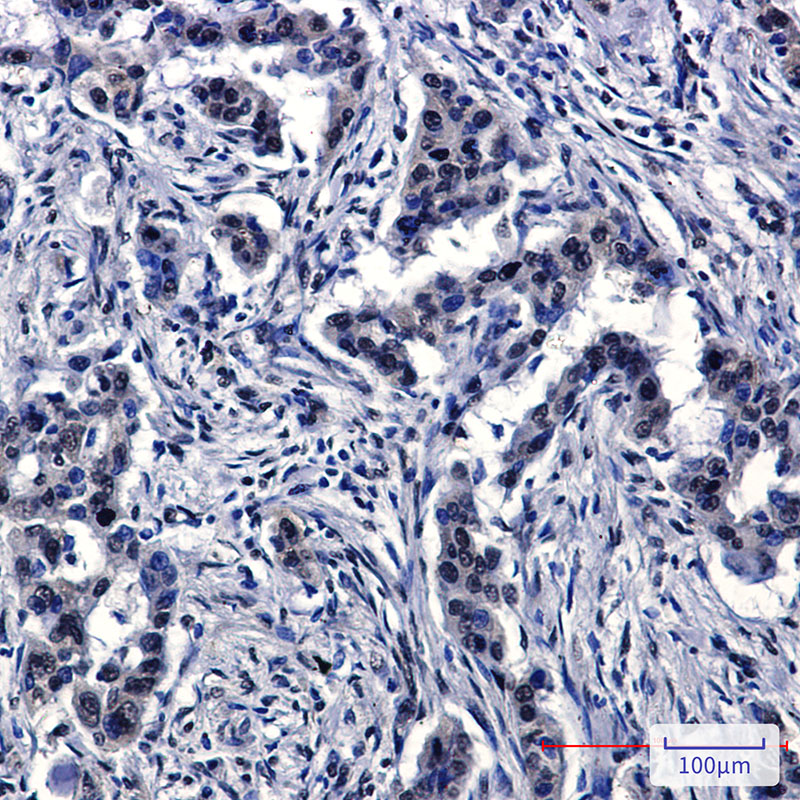

| WB | 1/500-1/1000 | Human,Mouse,Rat |
| IF | 1/20 | Human,Mouse,Rat |
| IHC | 1/50-1/100 | Human,Mouse,Rat |
| ICC | 技术咨询 | Human,Mouse,Rat |
| FCM | 咨询技术 | Human,Mouse,Rat |
| Elisa | 咨询技术 | Human,Mouse,Rat |
| Aliases | Cul4a; Cullin-4A |
| Entrez GeneID | 8451 |
| WB Predicted band size | Calculated MW: 88 kDa; Observed MW: 88 kDa |
| Host/Isotype | Rabbit IgG |
| Antibody Type | Primary antibody |
| Storage | Store at 4°C short term. Aliquot and store at -20°C long term. Avoid freeze/thaw cycles. |
| Species Reactivity | Human |
| Immunogen | A synthetic peptide of human Cullin 4A/CUL-4A |
| Formulation | Purified antibody in TBS with 0.05% sodium azide,0.05%BSA and 50% glycerol. |
+ +
以下是3篇与CUL4A抗体相关的参考文献,涵盖其功能和应用研究:
---
1. **文献名称**: *"CUL4A ubiquitin ligase is a potential therapeutic target in multiple myeloma"*
**作者**: Li Y. et al.
**摘要**: 该研究通过Western blot和免疫共沉淀技术,使用CUL4A抗体验证其在多发性骨髓瘤细胞中的高表达,并证明其通过调控细胞周期蛋白促进肿瘤增殖,提示其作为治疗靶点的潜力。
---
2. **文献名称**: *"CRL4A-CDT2 ubiquitin ligase regulates DNA replication licensing via CDT2 degradation"*
**作者**: Jin J. et al.
**摘要**: 研究利用CUL4A抗体进行免疫荧光染色,发现CRL4A复合体通过降解CDT2蛋白调控DNA复制许可,揭示了CUL4A在基因组稳定性维持中的关键作用。
---
3. **文献名称**: *"HIV-1 Vpr hijacks CUL4A-DDB1 ubiquitin ligase to induce cell cycle arrest"*
**作者**: DeHart J.L. et al.
**摘要**: 通过免疫沉淀(IP)结合CUL4A抗体,阐明HIV病毒蛋白Vpr劫持CUL4A-DDB1泛素连接酶复合体,诱导宿主细胞G2/M期停滞,为病毒致病机制提供新见解。
---
4. **文献名称**: *"CUL4A overexpression enhances angiogenesis in breast cancer by targeting HIF-1α/VEGF pathway"*
**作者**: Chen L. et al.
**摘要**: 使用CUL4A抗体进行免疫组化分析,发现其在乳腺癌组织中高表达,并通过调控HIF-1α/VEGF通路促进肿瘤血管生成,提示其作为预后标志物的可能性。
---
这些研究均通过CUL4A抗体探究其在疾病机制、蛋白质相互作用或治疗靶点中的作用。如需具体文献链接或补充更多研究,可进一步提供关键词筛选。
Cullin 4A (CUL4A) is a core component of the Cullin 4A-RING E3 ubiquitin ligase (CRL4) complex, which plays a critical role in ubiquitin-mediated protein degradation. As part of the cullin family, CUL4A functions as a scaffold protein, binding adaptor proteins like DDB1 at its N-terminal domain and recruiting RING finger proteins (e.g., RBX1) at its C-terminal domain to facilitate substrate recognition and ubiquitin transfer. This complex regulates diverse cellular processes, including DNA repair, cell cycle progression, chromatin remodeling, and apoptosis. Dysregulation of CUL4A has been implicated in various pathologies, such as cancer, viral infections, and developmental disorders, due to its role in degrading tumor suppressors (e.g., p21. p27) or modulating oncogenic signaling pathways.
CUL4A antibodies are essential tools for studying its expression, localization, and interactions. They are widely used in techniques like Western blotting, immunoprecipitation, and immunohistochemistry to investigate CRL4 complex dynamics or disease mechanisms. These antibodies are typically raised against specific epitopes of human CUL4A, with monoclonal and polyclonal variants available. Validation includes testing in knockout cell lines or tissues to confirm specificity. Researchers also employ CUL4A antibodies to explore its overexpression in cancers (e.g., breast, lung) linked to genomic instability or therapeutic resistance. Understanding CUL4A's regulatory networks through such antibodies aids in developing targeted therapies against CRL4-dependent malignancies.
×